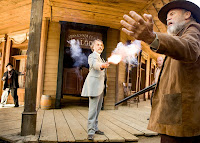The
real question is where’s the Gatling gun?
The nineteenth century machine gun certainly found its way into Sukiyaki Western Django, Takeshi Miike’s
homage to Corbucci’s spaghetti western. Considering
the shtickiness of his supporting performance in Miike’s film, Quentin
Tarantino has good reason to distinguish his Django pastiche from its predecessor. This he surely does, re-conceiving the gritty
western as a blaxploitation revenge beatdown.
Frontier justice gets a whole new look in Django Unchained (trailer here), which opens Christmas Day nationwide.
Dr.
King Schultz is no ordinary dentist. The
German expat has taken up the more lucrative work of bounty hunting. He also finds slavery appalling, so he has no
qualms about liberating a slave to help him track down the Brittle Brothers, three
of his former overseers who are now wanted by the law. That slave is Django and when he teams up
with Schultz, the Brittles do not stand a chance.
As
everyone knows from Unchain’s media campaign,
Django embraces bounty hunting because he gets paid for killing white
people. However, he and Schultz make
good partners, even becoming friends.
After a profitable winter of killing outlaws, Schultz agrees to help the
freeman liberate his wife, Broomhilda, who was taught German by her homesick
former owner. Unfortunately, she was recently
purchased by Calvin Candie, the master of the notorious Candyland
plantation. A bit of subterfuge will be
required to buy Broomhilda’s freedom, but Shultz has a suitably dubious
plan.
They
will masquerade as a prospective slave fight promoter and his free “Mandingo”
advisor looking to buy one of Candie’s brawlers. Of course, the white racists of Candyland
have trouble dealing with Django on civil terms, but the promise of Schultz’s
cash keeps them temporarily in check.
Unfortunately, Stephen (as in Fetchit?), the head house slave is
instantly suspicious of Django and his partner.
The
weird racial undercurrents detectable in Tarantino’s previous films build into
a tidal wave in Unchained. On the surface, it is a scathing indictment
of the antebellum era Deep South. There
will be retribution of Biblical proportions, carried out in some of the best
choreographed shoot-outs since John Woo’s Hard
Boiled. However, before justice is
served, Tarantino will thoroughly objectify African Americans, both men and
women, and unleash a blizzard of racial epithets. Yet, he will largely get away with it because
of the film’s ostensibly politically correct sense of moral outrage.
When
watching Unchained, one gets a sense
Schultz and Candie represent two sides of the auteur’s persona. Schultz is the white trickster he wants to be,
finding acceptance from African Americans through social conscience and hipster
sensibilities. Yet, if you peaked into
the dark recesses of his subconscious, one might find fantasies of the master,
slinking off to the slave quarters late at night.
While
he looks a bit like Christopher Guest, Christoph Waltz thoroughly dominates the
film as Schultz. Conveying a charismatic
sense of danger, he is the only character who consistently surprises viewers,
while serving as the film’s figure of tolerance. Waltz also has the perfect flair for Tarantino’s
dialogue, which is razor sharp as ever.
In fact, the period setting is something of a blessing, forcing him to
avoid ironic pop culture references.

Jamie
Foxx is appropriately flinty when going toe-to-toe with his racist antagonists,
but lacks Waltz’s dynamic screen presence.
Cruel but disturbingly subservient, Samuel L. Jackson’s Stephen is one
of the most distinctive villains of the year.
Yet, on some level, it is oddly problematic that Unchained invites the most scorn for an African American character. Conversely, Leonardo DiCaprio and his pasted
on mustache are simply ridiculous as Candie.
Completely lacking gravitas or menace, he looks like he should have a
surf board under his arm rather than a whip.
Tarantino
delivers some spectacular mayhem and some wickedly clever lines. Still, there is a leering tone to the film
that feels wrong when the bullets are not flying. Regardless, there is enough attitude and
inventive bloodshed to satisfy the filmmaker’s fans, as well as a cool cameo
from the original Django, Franco Nero, but the running time of one hundred sixty-some minutes is just excessive. By comparison, Corbucci's Django kills just about as many people in nearly half the time. Recommended strictly for connoisseurs of more violent exploitation films and
spaghetti westerns, Django Unchained opens
wide this Christmas.











